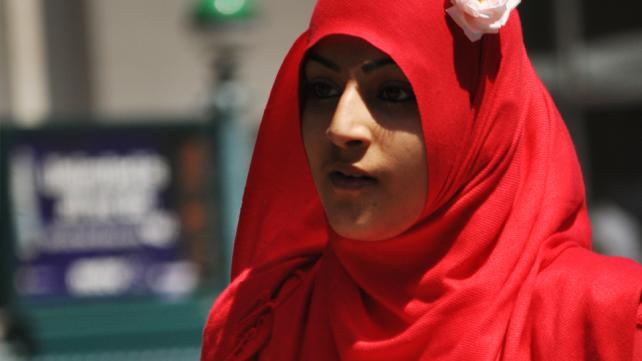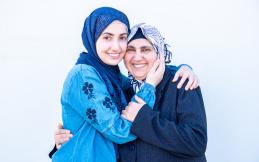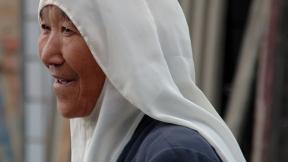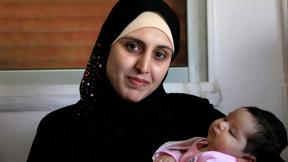
Strengthening women in the Muslim community is a long-term process, but here are some simple ways to begin:
1. Recognize and validate traditional women’s roles
Stay-at-home mother. Devoted wife. Doting daughter. These are all roles that more traditional Muslims, in particular, laud as the highest station for women. Yet, they are rarely acknowledged for the tremendous benefits they bring to Muslim families, and by extension, Muslim communities.
Starting with the next community event, have male speakers acknowledge and publicly thank these women in their lives. It could be the mother who helped a young man memorize the Quran; the wife of the Imam, who helped him hash out ideas and shape his speech through discussions and help with research; the daughter of a fundraiser, who helped him develop the pitch he needed to raise the funds for a project. All of these women need to be recognized publicly for the indispensable help they offered.
It’s a small gesture, but one that will make the community’s men and boys realize that “women’s work” in the traditional sense is enormously important. It will also give a much-needed boost to sisters who often feel their efforts are taken for granted or minimized.
2. Address domestic violence and family abuse head on
Violence in the family is the way women have long been held back and disempowered. This type of abuse which Prophet Muhammad, peace and blessings be upon him, hated, must be addressed and tackled urgently in all Muslim communities. Even one case is too many. For ideas on how to work on this issue, please check out our Domestic Violence page.
3. Acknowledge and recognize women volunteers, specifically
Women are the backbone of volunteerism in the Muslim community in so many ways. You will usually not encounter them as high profile speakers and fundraisers, but nine times out of ten, you’ll find them responsible for taking care of the food at events. And for all the importance given to speakers and fundraisers at dinners, if the food arrangements aren’t well-organized, the whole evening can be ruined.
Women are often the first to volunteer their time to teach at Islamic weekend schools. This is especially with children in younger grades, who require more patience and are frankly, not as fun to teach as older kids who can better understand more complex aspects of Islam.
These are just two examples, but they simply reflect the kind of “grunge work” most men choose to shun for more “prestigious” volunteerism (e.g. speaking and fundraising).
Acknowledge the sister volunteers of the community with a special event and hand out awards; print their names with a note of thanks in the community newsletter and publish them on your mosque or Islamic center’s website. Be creative. There are many more ways to offer thanks. The reward of doing this will be renewed enthusiasm on their part and encouragement for the young women in the community to serve in the future as well. For the men, it will instill a recognition of women’s oft-neglected contributions.
4. Teach Women’s Studies….Islamic style
Starting next year, offer classes about Women’s Studies and Women’s History in your Islamic weekend school, Halaqas and full-time Islamic schools. These need to go way beyond the usual brief chapters discussed about Maryam, Asiya, Fatima, Khadija and Aisha (may Allah be pleased with them all). The courses need to discuss the impact these five fundamental women have had on the development of Islam and the Muslim community as a whole, not just the women. Companions of the Prophet by Abdul Wahid Hamid, offers a great compilation of lesser known women among the first generation of Muslims.
In addition, these classes need to highlight the many, many Muslim women throughout history whose contributions have long been ignored, but who have sacrificed their wealth, skills, talents and lives for Islam. Some more recent examples from within the American Muslim community include pioneers Lois Lamya Faruqi, Maryam Funches and Shareefa Alkhateeb.
5. Set up an Aisha bint Abu Bakr Scholarship
This would be a scholarship offered to a Muslim woman to study at an institution of higher Islamic learning with the aim of becoming a scholar. The condition of receiving this financial assistance would be that the recipient return to her community and share and implement her knowledge, especially to empower Muslim women.
6. Incorporate stories of Muslim women in Friday Khutbas
Friday sermons are an indispensable tool for mass Islamic education. They offer the best platform to address the community as a whole on not just women’s rights, but generally, how women are the fabric of a solid Muslim community. Imams and Khateebs need to weave stories of the struggles and sacrifices of Muslim women into their sermons, instead of just devoting one Khutba every few years on the topic of “the status of women in Islam”.
For instance, a Khutba on the need to be generous in establishing the Muslim community can mention examples of the tremendous amount of wealth Khadija devoted to the cause; a Khutba on knowledge should not omit the incredible scholarship of Aisha. May Allah be pleased with both of them.
7. Make sure sisters are represented in the mosque, Islamic center or organization’s leadership
This means going beyond establishing a “women’s committee” at the Masjid that simply deals with “women‘s issues”. Women must be included on critical decision-making bodies because their input offers the kind of Shura (consultation) that directly affects half of the Muslim community and many times, all of it. For example, if your mosque or center is expanding or renovating, few brothers will understand the need for including a diaper changing station in a bathroom. A sister is more likely to bring this up. And as more daddies are involved in child care nowadays, this is no doubt an idea fathers visiting mosques would also welcome.
At the time of Prophet Muhammad, peace and blessings be upon him, women freely discussed issues that concerned them with him and later, with other community leaders. They did this inside and outside the mosque. Whatever method they chose, be it public or private, they let their voices be heard. Let the Muslim women in your community also be able to voice their critical input.
8. Drop unIslamic double standards in word and action
While cultural double standards when it comes to men and women’s behavior have long existed in the Muslim community, this is hardly an Islamic practice. If brother X is known to be dating his fourth girlfriend, his behavior should not be ignored or brushed off with the “boys will be boys” refrain so common in the community.
Similarly, if sister Y is seen talking to a boy, she should not be accused of being “loose” or worse. This is where Islamic standards of dealing with the opposite sex need to be made known to the entire community, through Khutbas, as well as gently and wisely correcting those who practice cultural double standards anathema to Islam.
9. Start a Muslim women’s debate club
The aim of this exercise would be to help Muslim women, specifically, address the oft-repeated accusation that Islam is an anti-woman religion. Young Muslim women in middle and high school as well as college should be the primary participants and it should be run by people who are not only knowledgeable about Islam, but also those who have some expertise in debating (e.g. someone who is on their own school’s debating team).
Through the process of debating, members will strengthen their own understanding of women’s issues within an Islamic framework, as well as get the tools they need to defend and discuss this aspect of Islam.
10. Give them the info they need to seek knowledge
The phrase “knowledge is power” has become a tired cliché but it’s a truism that continues to affect so many Muslim women. To kick off the knowledge = empowerment theme in your community, start off by compiling a comprehensive list of local classes, workshops, seminars, etc. Make this list available not only via email, on your blog or on a listserv, but also, the old-fashioned way: by putting fliers in the mosque’s women’s section. That way, women have the tools at their fingertips on or offline to begin their journey to empowerment.
Also make sure that the information is translated into the language most used amongst the women who frequent the Masjid.
Photo Attribution: Ludovic Bertron - http://commons.wikimedia.org/wiki/File:Integration_(3602103744).jpg








Comments
I don't see why the gender of the writer makes a difference. My criticisms of the article--which I thought had some very good suggestions--are still the same, regardless. I think there needs to be more emphasis on the fact that women can contribute more to the leadership, organizational, and intellectual needs of Muslim communities as opposed to just making food and caring for kids. While these things are important and should be valued too, I think our Muslim communities often neglect the other varied talents of women. Thus, a Muslim woman can contribute her talents to help a secular business, organization, government agency,or university to thrive while she only contributes biryani to the masjid. Our communities are losing out when we neglect to recognize this.
Location
Article is written by a volunteer sister not a brother. Sound Vision.
Location
Some of these suggestions are good, especially the part about women actively participating in masjid leadership roles. However, I too agree that in some ways this articles falls short by focusing too much on the traditional, domestic roles women can serve. I mean, was the example of a changing station as a Muslim woman's contribution to a shura the best possible example the author could come up with? If this is all men think we have to offer, no wonder we're not invited to any meaningful discussions. When will our leadership realize that in today's society women are professionals, academics, and business leaders who have more to offer to a shura than suggestions for changing babies?
Location
Once again, the author falls short even though s/he means well. "Traditional": is the problem with Islam today. Has everyone forgotten that Khadijah was a business woman? That the Prophet (saws) helped his wives with the housework? That they "debated" with him (saws)? That we are ALL equal in the eyes of Allah (swt) except for our faith? That we are enjoined to be "partners" and "help-mates" with our spouses? Traditional middle-eastern values have corrupted Islam. Too many men think that they are the "god" of the household and that they "own" their wives. Would that we had the Prophet (saws) with us today to guide us out of the mess we have made.
Location
Add new comment